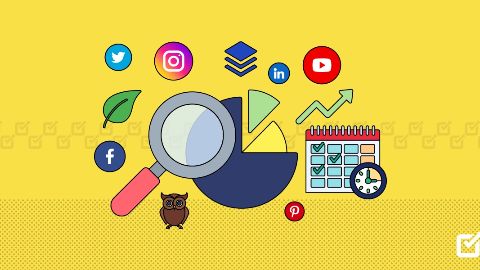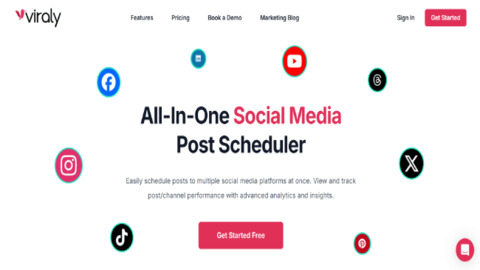
12 Social Media Analytics Tools For 2025 (Comparison Part 1)
In this post, I'll reveal all my top picks and review each of Social Media Analytics Tools in detail. I'll explain what they can do, outline their features, discuss their pros and cons, and tell you everything else you need to know.

The leading social media analytics tools compared part 1
#1 Social Status
Social Status is a dedicated social media analytics tool. That means it doesn't have all the extra bells and whistles you get with all-in-one platforms (think content scheduling, inbox management, etc.). But as far as analytics are concerned, it's second to none.
You get way more data than any other tool, allowing you to analyze every aspect of your social media efforts. There are four different dashboards you can open up depending on what you want to analyze.
The Profile Analytics page gives you all the metrics you need to evaluate your organic performance across social media channels, including post impressions, engagements, video views, link clicks, audience growth, demographics, posting frequency, and more.
Meanwhile, the Ads Analytics page offers data on your paid performance, including link clicks, cost per click (CPC), landing page visits (LPV), and cost per landing page visit (CPLPV) of all your social media ads.
There's also the Competitor Analytics dashboard, where you can view detailed insights into any public profile or page and benchmark it against your own social accounts, and the Influencer Analytics page, where you can discover, evaluate, and compare important creators in your industry.
I like how flexible the reporting tool is too. You can customize the report templates to show exactly what you want them to show. Plus, export in pretty much any format—CSV, PDF, PPTX, etc. Plus you can schedule them in advance, which is always useful.
One thing to note is that while Social Status supports all the major social networks—Facebook, Instagram, TikTok, LinkedIn, X, and YouTube—it doesn't offer insights into more niche networks like Bluesky, Threads, and Pinterest.

Pros and cons
✔Analyze social media posts, ads, competitors, and influencers
✔Deeper insights than most other tools
✔Very flexible and powerful reporting
✔Provides social media benchmarks for all industries
❌Only supports the most popular social networks
❌Only offers analytics & reporting (no publishing or inbox tools)
#2 ContentStudio
Its analytics dashboard gives you real-time insights into how your content is performing across multiple social media channels: Facebook, Instagram, TikTok, Pinterest, Facebook, YouTube, and LinkedIn.
It covers all the essential metrics, including profile growth, audience demographics, engagements, best/worst performing posts, etc.
SocialBee offers pretty good competitor analytics too. You track all your social media rivals' KPIs and benchmark your performance against theirs, with a side-by-side comparison of your publishing frequency, engagement rate, follower growth, and other metrics.
I also can't fault ContentStudio's reporting capabilities. It lets you pre-schedule custom reports to land directly in the email inbox of up to 25 recipients. You can generate reports for each social channel individually or stack the stats together into one group report.
ContentStudio isn't just for analytics either. You can also use it to plan, create, and schedule posts. Plus, engage with your audience, and find and curate trending content from across the web.
Its standout feature is the Discovery tool. This lets you analyze top-performing content across the web—articles, videos, and more—based on engagement metrics and sentiment analysis. If you spot something worth sharing, you can instantly schedule it as a post using the built-in scheduler.

Pros and cons
✔Ideal for content marketers
✔Cross-channel insights
✔Great competitor analytics & benchmarking
✔Fantastic reporting tool
✔Can also analyze curated content for social media
❌Locks some features behind higher-tier plans (like competitor analysis)
❌Support could be better
#3 SocialBee
SocialBee isn't a dedicated analytics tool like Social Status. It's more of an all-in-one, AI-powered social media toolkit.
You can do all sorts of things with it, like create and schedule social media posts to every network, arrange them into content categories, manage and reply to comments and DMs… It even has a built-in AI copilot that can plan your entire social media strategy end-to-end.
All those tools work hand-in-hand with the analytics features. Once you've started publishing content, you can keep track of how it's performing in SocialBee's analytics dashboard.
Just choose the social media account you want to analyze. Then, you'll see top-level metrics like follower growth, average post engagement, reach, average number of posts per day, etc. with graphs to show you how all that's changed over time.
There are also deeper insights available. For example, I like how SocialBee can show you your top posts, content categories, and post type for any metric (most likes, most shares, most impressions, etc.).
I also like how you can display heatmaps and bubble maps to visualize the distribution of impressions, engagements, likes, comments, and shares your posts get throughout the day. This comes in useful for pinpointing your best time to post on each network (though SocialBee can work that out for you automatically anyway).
All that said, there are some areas where SocialBee falls short. For one, I think its reporting capabilities could be better. As far as I know, you can only export custom PDF reports—you can't schedule them to be emailed out to clients (this is something I'd have liked to see).
Also, keep in mind that SocialBee is only good for analyzing organic social media content performance and growth. You can't analyze your social media ads or competitors with it like you can with Social Status.

Pros and cons
✔The best choice for social media content analytics
✔Schedule and analyze posts by category
✔View best time to post suggestions
✔Nice data visualizations (heatmaps, graphs, charts, etc.)
✔Powerful AI features
❌Can't schedule email reports
❌Doesn't offer social media ads, competitor, or influencer analytics
#4 Metricool
When I saw how affordable Metricool was, I wasn't expecting much, so I was pleasantly surprised by how good its analytics feature was.
It offers everything you could want in one place—organic and paid performance metrics, competitive benchmarking, influencer analysis, and more. That's for all the main social platforms by the way, plus some niche networks like Twitch.
I found the reporting tool both flexible and easy to use. You just choose the period you want to report on, the metrics you want to include, and the design, then hit generate.
I particularly like how you can create custom report templates with your preferred aesthetic/design and reuse them again and again. This is a big time-saver.
Another really neat thing about Metricool is it's one of the only social media analytics tools I've tried with a Looker Studio connector.
So, you can set Metricool up as a data source in Google's Looker Studio, where you can combine it with data from other sources—like Google Ads and Google Analytics—for a full-funnel view of your digital marketing effectiveness.
Aside from analytics, Metricool also comes with other social media tools such as post scheduling, inbox management, AI writing, and a link in bio tool.

Pros and cons
✔Great value for money
✔Analyze posts, profiles, competitors, and influencers.
✔Organic & paid insights
✔Save custom report templates
✔Looker Studio connector
✔Supports most social networks (including niche options like Twitch)
❌The user interface could use work
#5 Sendible
It boasts advanced, flexible, multi-channel reporting and offers unique data and insights you don't get with many other analytics solutions. Analyze your social media performance and audience, measure ROI, evaluate engagements and growth, track mentions… it can do it all.
You can view data at the post, page, and campaign levels, and use the drag-and-drop report builder to visualize exactly what you want to see, with customizable templates and 200+ data modules to choose from.
But the best thing about Sendible is that it's fully white-label, so you can add your branding everywhere. Not just to your reports, but across the whole app.
You can choose your colors, add your logo, and even host Sendible on your domain so it looks like your own in-house software.
And with the client connect feature, clients can log in to their own branded client portals and connect their socials without having to hand over their usernames and passwords to you.
Keep in mind also that Sendible is an all-in-one social media toolkit. So, in addition to the analytics and reporting features, you also get other tools for things like post creation, publishing/scheduling, engagement management, content curation, and more.

Pros and cons
✔Ideal for agencies
✔Fully white-label solution
✔Comprehensive and in-depth analytics
✔Advanced reporting capabilities
✔Very feature-rich
❌Less suitable for individuals (agency-focused features)
❌Higher starting price
#6 Viraly
Viraly offers better value for money than most, with a robust set of scheduling features along with post and channel analytics for all the leading social media platforms.
Post-level insights include metrics like impressions, reach, clicks, reactions, comments, shares, video views, etc. for each piece of content that you publish. Page-level insights include things like follows/unfollows, total page reach/impressions, top audience countries/cities, etc.
Graphs and charts help you visualize all that data and how it's changed over time, allowing you to evaluate your performance at a glance.
It offers more than analytics too. You can also use it to create posts (with AI caption generation and built-in photo editing), schedule & auto-publish posts, set up content queues, and a whole lot more.

Pros and cons
✔Fantastic value for money
✔Social media post and channel analytics
✔Covers a wide range of metrics
✔Great data visualizations
✔Adding new features fast
❌Missing some advanced metrics
❌No social listening features
You May Like
Mastering B2B Social Media Marketing: Your Guide to Success
In the ever-evolving landscape of digital marketing, social media has become an essential platform for businesses. This is especially true for B2B (business-to-business) marketing. Why social media is crucial for B2B marketing and how to craft a strategy that leverages its full potential?
14 Essential Social Media Monitoring Tools for Businesses in 2024
In the fast-paced digital landscape of 2024, staying ahead of the competition means understanding what your customers are saying about your brand. Social media monitoring tools are essential for capturing real-time insights, analyzing trends, and engaging effectively with your audience.
Social Media Monitoring Tools: From Data Overload to Strategic Intelligence
The social media monitoring ecosystem has undergone explosive growth in recent years, transforming from a niche marketing tool into a mission-critical intelligence platform. The social media monitoring tools are essential for most business companies.
The Ultimate Guide to Social Media Analytics Tools for 2025
The 2025 social analytics landscape is dominated by AI-powered platforms offering predictive insights, cross-platform unification, and privacy-compliant tracking. Leading tools like TOOM, KAWO, and Secretary transform raw data into strategic foresight, enabling brands to anticipate trends and optimize content.
Mastering Your Social Voice with Scheduling & Management Tools
Juggling multiple platforms? Scheduling tools like Buffer, Hootsuite & Sprout Social automate posting, analyze performance & streamline engagement. They save time, boost consistency, provide data-driven insights, and centralize management – essential for effective social media strategy in 2024. Discover key features & top picks.
12 Social Media Analytics Tools For 2025 (Comparison Part 2)
In this post, I'll reveal all my top picks and review each of Social Media Analytics Tools in detail. I'll explain what they can do, outline their features, discuss their pros and cons, and tell you everything else you need to know.